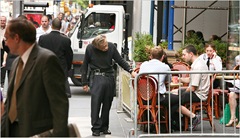On the occasion of my one-year anniversary in Suburbia, or "not-Manhattan" as I have been known to phrase it, I thought I would offer a few notes on the impact this experience has had on the complex and delicate clockwork tangle that constitutes my inner mechanism.
Let me first acquaint you with my mind-set vis-a-vis Suburbia, such as it was prior to our urban decampment, by offering up this quote from Lewis Mumford's California and the Human Horizon, written around the year of my birth (that's like 40 years ago) :
"Physiologically the worse for wear, our American reaches his dwelling, where he finds a house and a wife in the midst of what is usually called ideal suburban surroundings: a green ghetto, half natural, half plastic, also cut off from human contact, where his wife has for her chief daily companions in her solitude the radio set, the soap opera, the refrigerator, the automatic mixer, the blender, the vacuum cleaner, and , if she is lucky, the second car. They and their children finally, together or by turns, immobilize themselves before a television screen, where all that has been left out of the actual world, all their unlived life, flickers before their eyes, in images that give a faked sense of the realities they have turned their backs to, and the impulses they have been forced to repress. Even here, the machine-conditioned American has no proper life of his own: for what he sees and hear and interprets contains only so much of the real world as the great corporate organizations, military, commercial, and political, which control this medium, will permit for the furthering of their own machine expanding, power-buttressing, or money-making ends. Freedom of selection is chiefly the the freedom of choosing more of the same from another channel."
It still brings tears to my eyes, and he continues brilliantly for another twelve pages!
Well, it wasn't long after my arrival in Manhattan in 1998 that I detected the effects which perpetual overstimulation has on the nervous system. Walking down First Avenue one morning, I noticed that I was feeling rather like a french fry dropped into hot oil, with my every synapse crackling and sizzling from excessive activation. Eventually though, the mind reaches equilibrium with its environment- one acclimates to one's surroundings. All neuroses and anxiety disorders for which New Yorkers are famous result from this saturation of the mental floodplain. The pumps fail to keep up with the challenging influx of experience.
 Ten years later, in contemplation of my farewell, I searched inwardly to discern what I might be leaving behind, and the vague understanding I achieved was serendipitously captured by Frank Bruni in an amusing NY Times piece. He was attempting to explain why Manhattan diners would wish to eat al fresco, under unpleasantly demanding environmental circumstances. He came up with three theories and this was my favorite:
Ten years later, in contemplation of my farewell, I searched inwardly to discern what I might be leaving behind, and the vague understanding I achieved was serendipitously captured by Frank Bruni in an amusing NY Times piece. He was attempting to explain why Manhattan diners would wish to eat al fresco, under unpleasantly demanding environmental circumstances. He came up with three theories and this was my favorite:
"Theory 2: New Yorkers have a highly evolved, unrivaled knack for glossing over the limitations, absurdities and dubious habitability of an unforgiving metropolis.
They walk into a friend’s 545-square-foot two-bedroom (one bath, no tub) and stammer: 'Just $4,965 a month for this?' They walk into the Spotted Pig at 5:55 pm on a Tuesday night and exult: 'Only a 90-minute wait?'
And they sit in a sidewalk cafe — sirens blaring, vagrants swearing and jackhammers jittering all around them — and sigh: 'It’s so relaxing to soak up the street life.'"
My own theory went something like: "Manhattan is great because you have the very best of everything, at your finger-tips, twenty-four hours a day." This was formulated around the time that I successfully located parts for the 40-year old toilet in our apartment, which, incidentally, were delivered same-day, by messenger, from Flushing, Queens. But that was all before the flourishing of Internet shopping.
After our move to the 'burbs I experienced a mild, yet fully-formed identity crisis. A shrub torn from the comfort of its nurturing asphalt garden, I dangled with my forlorn root ball exposed to scrutiny. Was it intact and vital? I did not know. What had I left behind? One thing about having a Manhattan address: you never tire of defining yourself by invoking it before strangers, and thereby it becomes part of you.
Let me return to my Year in Suburbia in Part Two of this post, but leave you with one clue: it all comes down to Summer vs. Winter.


